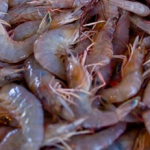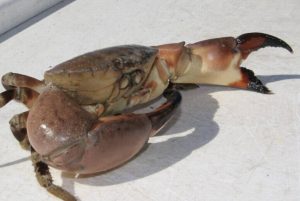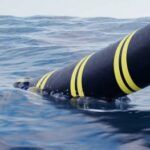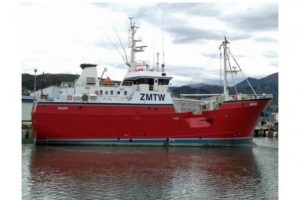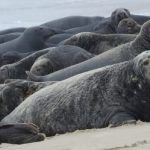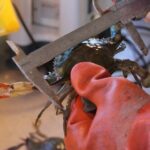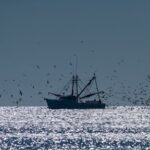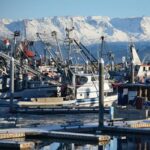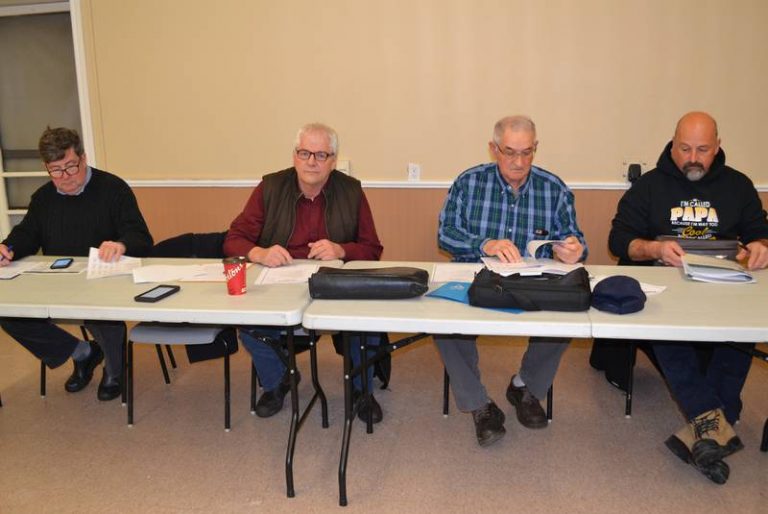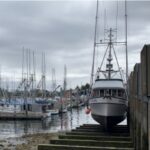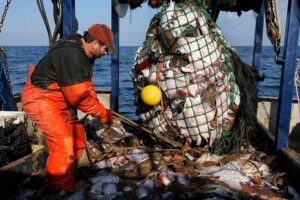Category Archives: New England
Wind Power: Broken Blades and (Maybe) Green Gouging
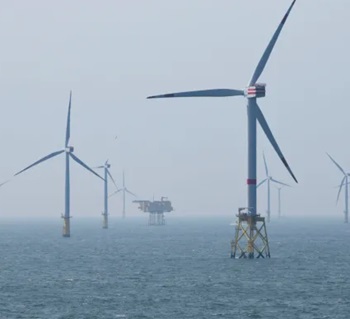 Say what you will about wind turbines, the steampunk wing of our glorious renewable future, their most dramatic failures have an epic quality about them — the toppling, the crumpling, the buckling, the bits and pieces flying through the air. The owner-operators of the two farms — Equinor for Empire and Orsted for Sunrise — are two of the top five global wind-farm investors and operators. They presumably know what they are doing, have access to attractively priced capital, good supply chains, and so on. In the last week, there has been a lot of talk from Democrats about greedflation, a convenient myth. They might want to turn their attention to greenflation, which is not, and indeed to any evidence of “gouging,” another of their supposed concerns, in this area. more, >>CLICK TO READ<< 08:28
Say what you will about wind turbines, the steampunk wing of our glorious renewable future, their most dramatic failures have an epic quality about them — the toppling, the crumpling, the buckling, the bits and pieces flying through the air. The owner-operators of the two farms — Equinor for Empire and Orsted for Sunrise — are two of the top five global wind-farm investors and operators. They presumably know what they are doing, have access to attractively priced capital, good supply chains, and so on. In the last week, there has been a lot of talk from Democrats about greedflation, a convenient myth. They might want to turn their attention to greenflation, which is not, and indeed to any evidence of “gouging,” another of their supposed concerns, in this area. more, >>CLICK TO READ<< 08:28
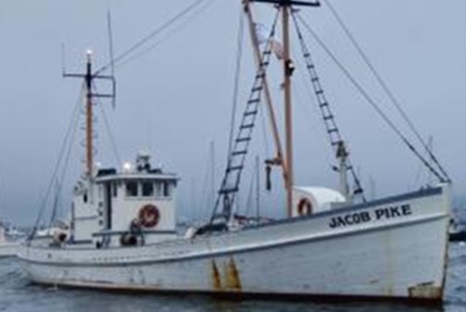
Effort builds to save historic legacy of sardine carrier ‘Jacob Pike’
At one stretch in Maine’s maritime history, the sardine was as mighty as the lobster, a fishery that employed thousands along the coast. Sardine canneries were a common sight beside busy harbors, and carriers plied the Gulf of Maine, especially in the warmer months. Thomaston was in the thick of the industry, a boatbuilding hub for sturdy fishing vessels that included the Jacob Pike. “The sardine industry back in the days was a big deal, rivaling what lobsters are today,” said Rockport Marine owner Taylor Allen, who himself spent several years restoring and then relaunching in 2020 the William Underwood, a sardine carrier built in 1941. “A lot of real estate along the coast was bought up by captains back in the day.” The Jacob Pike, built in 1949 at the Newbert and Wallace yard in Thomaston, was in the thick of it all from launching day. Photos, more, >>CLICK TO READ<< 06:41
Fishing Flotilla Protests at Still-Damaged Vineyard Wind Turbine as Debris Continues to Wash Ashore
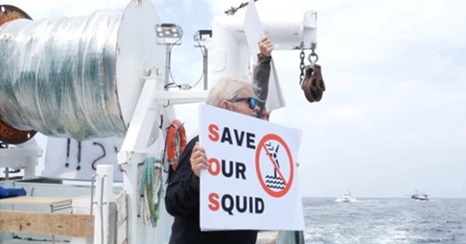 A flotilla of fishermen from across the East Coast gathered yesterday near the site of a damaged Vineyard Wind turbine to protest the perceived risks posed by offshore wind projects to the ocean and maritime communities. The protest, which also included a “Hands Across the Beach” demonstration on shore, highlighted growing concerns among fishermen about the impact of large-scale wind farms on their livelihoods and the environment. Vineyard Wind, which has been constructing towering turbine structures off the coast, has faced increasing criticism from local fishing communities. The concerns have escalated following a turbine blade failure in July that left fiberglass debris in the surrounding waters. more, >>CLICK TO READ<< 09:53
A flotilla of fishermen from across the East Coast gathered yesterday near the site of a damaged Vineyard Wind turbine to protest the perceived risks posed by offshore wind projects to the ocean and maritime communities. The protest, which also included a “Hands Across the Beach” demonstration on shore, highlighted growing concerns among fishermen about the impact of large-scale wind farms on their livelihoods and the environment. Vineyard Wind, which has been constructing towering turbine structures off the coast, has faced increasing criticism from local fishing communities. The concerns have escalated following a turbine blade failure in July that left fiberglass debris in the surrounding waters. more, >>CLICK TO READ<< 09:53
Fishermen organizing ‘flotilla’ protest against offshore wind
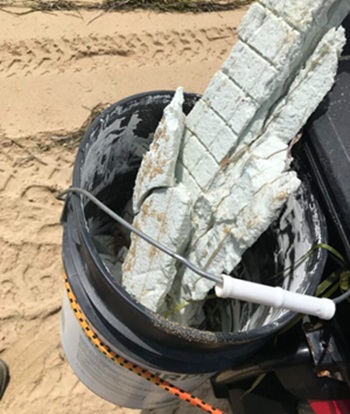 In response to recent concerns over offshore wind and with debris washing up on Nantucket and Island beaches from a fractured turbine blade, the New England Fisherman’s Stewardship Association (NEFSA) has organized a “flotilla” for this Sunday, bringing fishing boats together to peacefully protest in unison against the offshore wind industry. Boats will be joining together in a “boat parade” from various areas of the east coast, said NEFSA founder and CEO Jerry Leeman, including the Vineyard, Nantucket, parts of Massachusetts, Rhode Island and potentially New Jersey. more, >>CLICK TO READ<< 07:03
In response to recent concerns over offshore wind and with debris washing up on Nantucket and Island beaches from a fractured turbine blade, the New England Fisherman’s Stewardship Association (NEFSA) has organized a “flotilla” for this Sunday, bringing fishing boats together to peacefully protest in unison against the offshore wind industry. Boats will be joining together in a “boat parade” from various areas of the east coast, said NEFSA founder and CEO Jerry Leeman, including the Vineyard, Nantucket, parts of Massachusetts, Rhode Island and potentially New Jersey. more, >>CLICK TO READ<< 07:03
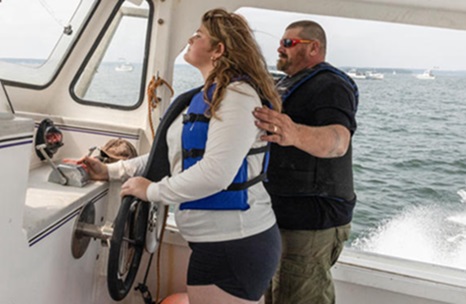
In Maine, a Father-Daughter Team Wins a Lobster Boat Race
Dozens of boats zipped across Casco Bay during the Maine Lobster Boat Races on Saturday. Only one had a purple bottom. That boat, a 32-footer with a powerful diesel engine, belonged to Jeremy Beal, 45, a large, soft-spoken man who comes from a long line of boat builders and lobstermen. “See, I grew up right in it,” he said between drags of a cigarette while leaning against the rail of his boat on the evening before the big race. For decades, Mr. Beal’s father, Wayne Beal, and an uncle, Calvin Beal, have built boats used by commercial fishers up and down the Maine coast. After years spent learning the family trade, Jeremy took over his dad’s business, Wayne Beal’s Boat Shop, in Jonesport, a seaside town more than 200 miles northeast of Portland. “I bought the boat off my father,” Mr. Beal said. “It was his last power boat. He’s retired out of the boat shop. I won’t sell the boat unless I have to. Just for the fact that it was my dad’s.” Photos, more, >>CLICK TO READ<< 11:33
SLO County activists oppose offshore wind projects. So they’re taking fight to national level
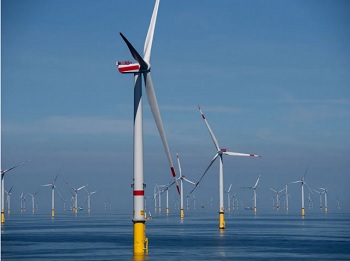 There’s a new national group fighting offshore wind development, and you may recognize some of their members. Two San Luis Obispo County anti-offshore wind activists have founded an organization called NOOA, the National Offshore-wind Opposition Alliance. So far, the group includes at least seven environmental and fishing organizations from the East and West coasts, according to President Mandy Davis. Group membership includes REACT Alliance, Protect the Coast Pacific Northwest, the Morro Bay Commercial Fishermen’s Organization, Green Oceans, Protect Our Coast New Jersey, Protect Our Coast Long Island New York and the Long Island Commercial Fishing Association, Davis said. more, >>CLICK TO READ<< 06:43
There’s a new national group fighting offshore wind development, and you may recognize some of their members. Two San Luis Obispo County anti-offshore wind activists have founded an organization called NOOA, the National Offshore-wind Opposition Alliance. So far, the group includes at least seven environmental and fishing organizations from the East and West coasts, according to President Mandy Davis. Group membership includes REACT Alliance, Protect the Coast Pacific Northwest, the Morro Bay Commercial Fishermen’s Organization, Green Oceans, Protect Our Coast New Jersey, Protect Our Coast Long Island New York and the Long Island Commercial Fishing Association, Davis said. more, >>CLICK TO READ<< 06:43
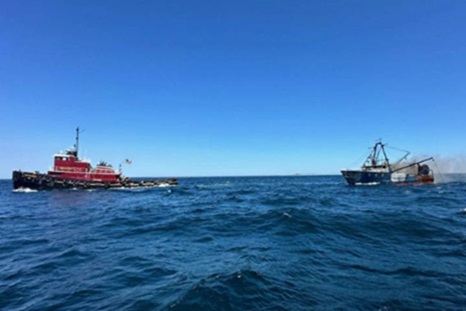
Tug Crew Tows Fire-stricken and Abandoned Trawler to Portland, Maine
Capt. Brian Fournier, president of Portland Tugboat, received the call seeking assistance, and his first thought was, “Do I have the equipment and most importantly the crew to engage in this type of rescue?” Fournier enlisted one of his most experienced crews and prepped them on the assignment. Capt. Jake Forgit, Mate Peter Roderiguez, Chief Engineer Ian Brushwein and Deckhand Aoi Daggett boarded the 110-foot (loa), 4,000-horsepower Nancy McAllister and left Portland, Maine in search of the Three Girls. Locating the trawler was no easy task. The tug and crew departed at 9 p.m. on August 12 and steamed overnight toward the estimated location of the trawler. The Nancy McAllister crew finally met up with the burning trawler at 11 a.m. on August 13—some 14 hours after setting out from Portland. The next job at hand, to safely hook up a tow line to a burning vessel, was also a challenge. The burning trawler had large outriggers with chains dangling on both sides, so getting close to the vessel proved difficult. Photos, more, >>CLICK TO READ<< 17:59
Lifelong Lobsterman Cary Burton Lunt of Bass Harbor, Me. has passed away
 Cary Burton Lunt, 77, passed away on Aug. 11, 2024, at the Bangor Nursing Home from complications from diabetes. He was born May 30, 1947, in Bar Harbor, the son of Clarence L. and Elsie R. Lunt. What can you say about a brother that saved your life when he was only 7, supported you his whole life through school, college, my career and was loved by all that met him? Cary was a born lobsterman. He hauled his first lobster trap at age 4, and continued until he couldn’t stand due to his diabetes. He was a long-time member/supporter of the Maine Lobsterman’s Association. He and his first wife, Marie Gray, were married on his boat, the Elsie V, and they had three children; Benjamin, Gabriel and Roseanna. more, >>CLICK TO READ<< 11:30
Cary Burton Lunt, 77, passed away on Aug. 11, 2024, at the Bangor Nursing Home from complications from diabetes. He was born May 30, 1947, in Bar Harbor, the son of Clarence L. and Elsie R. Lunt. What can you say about a brother that saved your life when he was only 7, supported you his whole life through school, college, my career and was loved by all that met him? Cary was a born lobsterman. He hauled his first lobster trap at age 4, and continued until he couldn’t stand due to his diabetes. He was a long-time member/supporter of the Maine Lobsterman’s Association. He and his first wife, Marie Gray, were married on his boat, the Elsie V, and they had three children; Benjamin, Gabriel and Roseanna. more, >>CLICK TO READ<< 11:30
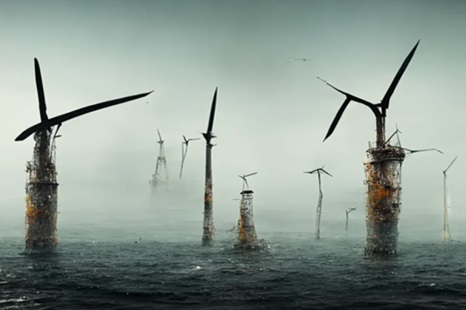
U.S. Offshore Wind: The Struggle Continues
This post updates the financial troubles of Denmark’s Ørsted, recent BOEM auctions, and pushback against Maryland governor Wes Moore. Today, operational offshore wind capacity is less than 50 megawatts versus the Biden-Harris Administration goal of 30,000 MW by 2030. Denmark’s Ørsted, the worldwide leading offshore wind developer, recorded a $575 million loss in the second quarter. In part, the loss is the result of disappointing developments in the U.S. The company has delayed commercial operation of its 704-MW Revolution Wind project off the coast of Rhode Island and Connecticut from 2025 to 2026. Ørsted’s ambitious U.S. offshore wind program has been lagging, despite solid support (subsidies, permits) from the Biden administration. more, >>CLICK TO READ<< 06;50
Athearn Marine Agency Boat of the Week: 68′ Gamage Steel Dragger, 3412 Cat, Permits available
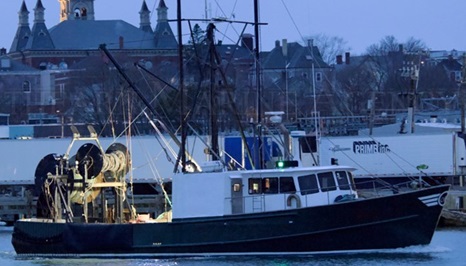 To review specifications, information, and 21 photos’, >click here< To see all the boats in this series, >click here< 06:23
To review specifications, information, and 21 photos’, >click here< To see all the boats in this series, >click here< 06:23
Nantucket Select Board no fan of federal wind farm regulator
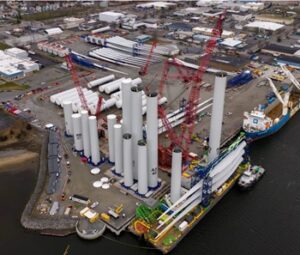 The Nantucket Select Board has released what might be described as a dispatch from the front lines of offshore wind development, a hot take on what it’s like to be a municipality trying to co-exist with the nation’s first industrial-scale wind farm. The hot take takes the form of answers to 25 frequently asked questions, some of which merely lay out the existing regulatory landscape Nantucket finds itself in while others criticize federal regulators for prioritizing national concerns over those of local communities. The Select Board sharply criticizes the main federal offshore wind regulator, the Bureau of Ocean Energy Management, or BOEM. “We do not believe BOEM is fulfilling its duty,” the board said. “We have seen little balance in BOEM’s permitting approach to offshore wind, which significantly favors industry developers, including foreign-government owned developers, over the legitimate concerns of US coastal communities and Tribal Nations.” more, >>CLICK TO READ<< 14:04
The Nantucket Select Board has released what might be described as a dispatch from the front lines of offshore wind development, a hot take on what it’s like to be a municipality trying to co-exist with the nation’s first industrial-scale wind farm. The hot take takes the form of answers to 25 frequently asked questions, some of which merely lay out the existing regulatory landscape Nantucket finds itself in while others criticize federal regulators for prioritizing national concerns over those of local communities. The Select Board sharply criticizes the main federal offshore wind regulator, the Bureau of Ocean Energy Management, or BOEM. “We do not believe BOEM is fulfilling its duty,” the board said. “We have seen little balance in BOEM’s permitting approach to offshore wind, which significantly favors industry developers, including foreign-government owned developers, over the legitimate concerns of US coastal communities and Tribal Nations.” more, >>CLICK TO READ<< 14:04
BOEM issues first floating offshore wind lease in the US
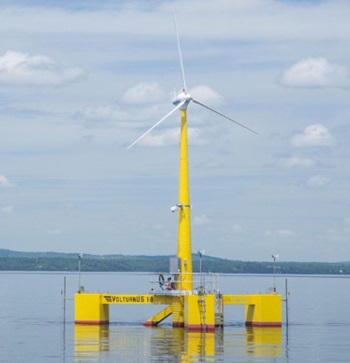 The lease area where the floating turbines will be deployed covers an area of approximately 15,000 acres located 28 nautical miles offshore Maine on the US Outer Continental Shelf. The area could allow for the deployment of up to 12 floating offshore wind turbines capable of generating up to 144 MW of renewable energy. The research array will allow the state, the fishing community, wildlife experts, the offshore wind industry, and others to conduct in depth studies and thoroughly evaluate floating offshore wind as a renewable energy source. As proposed, the research array will use floating foundation technology designed by the University of Maine and deployed by its development partner, Diamond Offshore Wind. UMaine’s floating platform, known as VolturnUS, was recently awarded a US$12.5M grant from the US Department of Energy. more, >>CLICK TO READ<< 07:28
The lease area where the floating turbines will be deployed covers an area of approximately 15,000 acres located 28 nautical miles offshore Maine on the US Outer Continental Shelf. The area could allow for the deployment of up to 12 floating offshore wind turbines capable of generating up to 144 MW of renewable energy. The research array will allow the state, the fishing community, wildlife experts, the offshore wind industry, and others to conduct in depth studies and thoroughly evaluate floating offshore wind as a renewable energy source. As proposed, the research array will use floating foundation technology designed by the University of Maine and deployed by its development partner, Diamond Offshore Wind. UMaine’s floating platform, known as VolturnUS, was recently awarded a US$12.5M grant from the US Department of Energy. more, >>CLICK TO READ<< 07:28

A Maine boat captain captured these stunning photos of the Northern Lights
When Amanda Bracy learned that the Northern Lights would illuminate the Maine sky earlier this week, she was determined to capture the rare sight. So, the boat captain pulled an all-nighter in Cranberry Isles near Acadia National Park. As a result, her kaleidoscopic photos have impressed tens of thousands of people online. “I’ve never seen it like that,” Bracy said about this week’s display. “It was mind blowing. It was me and just one other person down there and I was like, ‘Are you seeing this?’ You could definitely see all the colors — blues, greens, reds, oranges. It was pretty insane.” 12 Photos, more, >>CLICK TO READ<< 06:50
Biden-Subsidized Offshore Wind Developer Reports Massive Losses in Latest Blow to Industry
 A Danish renewable energy group booked huge impairment losses Thursday after it pushed back the launch of one of its U.S. offshore wind projects, according to its first-half 2024 earnings report. Orsted estimated the value of its assets declined $472 million in the first half of 2024, largely due to delays at the onshore substation for its 704 megawatt (MW) “Revolution Wind” project off the coast of Rhode Island and Connecticut, the report showed. The company also reported a variety of other problems, including losses related to its cancellation of its Ocean Wind projects in New Jersey and its abandoned effort to produce eco-friendly methanol in Sweden. “Despite encouraging progress on our US offshore wind project Revolution Wind, the construction of the onshore substation for the project has been delayed,” Orsted’s CEO Mads Nipper said in reference to the delay. “This is, of course, unsatisfactory, and we continue our dedicated efforts to de-risk our portfolio.” more, >>CLICK TO READ<< 17:03
A Danish renewable energy group booked huge impairment losses Thursday after it pushed back the launch of one of its U.S. offshore wind projects, according to its first-half 2024 earnings report. Orsted estimated the value of its assets declined $472 million in the first half of 2024, largely due to delays at the onshore substation for its 704 megawatt (MW) “Revolution Wind” project off the coast of Rhode Island and Connecticut, the report showed. The company also reported a variety of other problems, including losses related to its cancellation of its Ocean Wind projects in New Jersey and its abandoned effort to produce eco-friendly methanol in Sweden. “Despite encouraging progress on our US offshore wind project Revolution Wind, the construction of the onshore substation for the project has been delayed,” Orsted’s CEO Mads Nipper said in reference to the delay. “This is, of course, unsatisfactory, and we continue our dedicated efforts to de-risk our portfolio.” more, >>CLICK TO READ<< 17:03
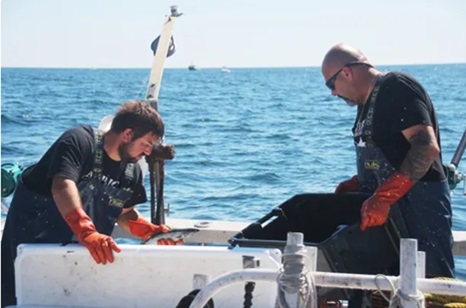
‘Wicked Tuna’ to End With Season 13 on National Geographic
“Wicked Tuna” has been canceled by National Geographic following the conclusion of its Season 13 run. “After thirteen seasons on the high seas and more than 200 incredible episodes, the long-running series ‘Wicked Tuna’ has concluded its run on National Geographic,” the cable channel said in a statement Friday. “The series celebrated one of America’s oldest industries since first premiering on National Geographic in 2012 and made internationally recognizable stars out of the intrepid commercial fishermen who brave the unrelenting North Atlantic waters to catch the elusive bluefin tuna. The cancellation of “Wicked Tuna” comes amid major cost cutting at National Geographic parent company Disney, which is consolidating operations among its linear TV networks. more, >>CLICK TO READ<< 18:01
Van Drew Holds Third Hearing on ‘Offshore Wind Industrialization’
 U.S. Rep. Jeff Van Drew (NJ-02), supported by U.S. Rep. Scott Perry (PA-10), held a field hearing in Brigantine on Tuesday, Aug. 13, to continue his public opposition to the Garden State’s efforts to build large offshore wind farms off the New Jersey coast. Brigantine Mayor Vince Sera played host for the hearing and introduced the event by calling offshore wind “one of the most important issues facing us on the East Coast.” He said state and federal officials pushing the offshore wind agenda “lied to us” in order to move ahead with projects that “make no sense.” Sera’s remarks set the tone of a meeting that was uniformly against the current offshore wind agenda. Picking up on those remarks Van Drew described the long oceanfront along the New Jersey coast as “a gift from God,” which he asserted is being squandered so a few people can make money off it. “That is what this is all about,” Van Drew added. more, >>CLICK TO READ<< 13:57
U.S. Rep. Jeff Van Drew (NJ-02), supported by U.S. Rep. Scott Perry (PA-10), held a field hearing in Brigantine on Tuesday, Aug. 13, to continue his public opposition to the Garden State’s efforts to build large offshore wind farms off the New Jersey coast. Brigantine Mayor Vince Sera played host for the hearing and introduced the event by calling offshore wind “one of the most important issues facing us on the East Coast.” He said state and federal officials pushing the offshore wind agenda “lied to us” in order to move ahead with projects that “make no sense.” Sera’s remarks set the tone of a meeting that was uniformly against the current offshore wind agenda. Picking up on those remarks Van Drew described the long oceanfront along the New Jersey coast as “a gift from God,” which he asserted is being squandered so a few people can make money off it. “That is what this is all about,” Van Drew added. more, >>CLICK TO READ<< 13:57
Scientists and Fishermen Agree About Uncertainty of Offshore Wind’s Impact
 Newport’s Energy and Environment Commission hosted a panel discussion on Aug. 8, “The Effect of Climate Change and Offshore Wind on Fisheries and Ocean Ecosystems,” where representatives from NOAA, the URI Graduate School of Oceanography, The Commercial Fisheries Center of Rhode Island, and the Kingston -based Commercial Fisheries Research Foundation responded to a series of prompts posed by commission Vice Chair Emily Conklin. A Q&A session followed, with about 60 people gathered at City Hall to participate. Many in attendance brought strong opinions both for and against the large- scale offshore wind development projects being built off the coast of Newport and Little Compton. Fred Mattera, a retired commercial fisherman who now serves as the president of the Commercial Fisheries Research Foundation and the executive director of the Commercial Fisheries Center of Rhode Island, gave voice to some of the skepticism felt by local commercial fishermen about the nature and scale of offshore wind development in New England. “I’m tired of the deceitfulness and this driven agenda of ‘it has to be done yesterday,’” he said. “We don’t want to look at hydrogen, we don’t want to even consider nuclear, the cleanest and best way to do it, but it’s all going to be offshore wind.” more, >>CLICK TO READ<< 08:31
Newport’s Energy and Environment Commission hosted a panel discussion on Aug. 8, “The Effect of Climate Change and Offshore Wind on Fisheries and Ocean Ecosystems,” where representatives from NOAA, the URI Graduate School of Oceanography, The Commercial Fisheries Center of Rhode Island, and the Kingston -based Commercial Fisheries Research Foundation responded to a series of prompts posed by commission Vice Chair Emily Conklin. A Q&A session followed, with about 60 people gathered at City Hall to participate. Many in attendance brought strong opinions both for and against the large- scale offshore wind development projects being built off the coast of Newport and Little Compton. Fred Mattera, a retired commercial fisherman who now serves as the president of the Commercial Fisheries Research Foundation and the executive director of the Commercial Fisheries Center of Rhode Island, gave voice to some of the skepticism felt by local commercial fishermen about the nature and scale of offshore wind development in New England. “I’m tired of the deceitfulness and this driven agenda of ‘it has to be done yesterday,’” he said. “We don’t want to look at hydrogen, we don’t want to even consider nuclear, the cleanest and best way to do it, but it’s all going to be offshore wind.” more, >>CLICK TO READ<< 08:31
Jonah crab
 As the story goes, the prophet boarded a ship to get as far away as possible from the city of Nineveh, where God commanded him to go and preach. In anger, God sent a storm to threaten the ship. His shipmates decided that Jonah was to blame for the storm and threw him overboard. We know where he ended up. It was a whale of a tale. For mariners, Jonah’s name became synonymous with bad luck. In more modern times, bad luck for lobster fisherfolk meant that they found a certain crab in their lobster pots, one that ate their bait before a lobster could get it, leaving the trap empty and, them, empty handed. That crab was called a Jonah crab because at one time it was a nuisance for participants in this fishery, an unfortunate and unprofitable catch. Oh, how times have changed. Jonah crabs have gone from pest to plate and are an up-and-coming trash to treasure species. At one time, these crabs were considered bycatch and often thrown back or discarded. more, >>CLICK TO READ<< 11:24
As the story goes, the prophet boarded a ship to get as far away as possible from the city of Nineveh, where God commanded him to go and preach. In anger, God sent a storm to threaten the ship. His shipmates decided that Jonah was to blame for the storm and threw him overboard. We know where he ended up. It was a whale of a tale. For mariners, Jonah’s name became synonymous with bad luck. In more modern times, bad luck for lobster fisherfolk meant that they found a certain crab in their lobster pots, one that ate their bait before a lobster could get it, leaving the trap empty and, them, empty handed. That crab was called a Jonah crab because at one time it was a nuisance for participants in this fishery, an unfortunate and unprofitable catch. Oh, how times have changed. Jonah crabs have gone from pest to plate and are an up-and-coming trash to treasure species. At one time, these crabs were considered bycatch and often thrown back or discarded. more, >>CLICK TO READ<< 11:24
New Jersey Terminates Ocean Wind Projects Amidst Environmental Concerns
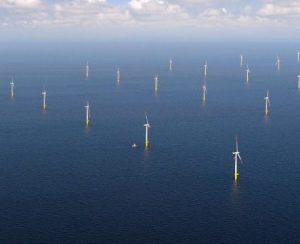 The New Jersey Board of Public Utilities (NJBPU) has officially revoked its prior approvals for the Ocean Wind One and Ocean Wind Two offshore wind projects. This decision comes after Cape May County filed lawsuits challenging the projects, citing environmental concerns. The State has agreed to allow Orsted, the foreign corporation behind the projects, to retain $175 million in escrow funds in exchange for the cancellation. “Today is a very important day in our ongoing opposition to these environmentally destructive offshore wind projects,” said Cape May County Commission Director Len Desiderio. “The vacation of these Orders by the BPU means that it will be much more difficult for Orsted or any other Big Wind company to utilize these lease areas just a few miles off Cape May County beaches. As we have seen in Nantucket over the past few weeks, these industrial electricity-generating facilities represent an unacceptable threat to our environment and, consequently, to our local economy. more, >>CLICK TO READ<< 06:44
The New Jersey Board of Public Utilities (NJBPU) has officially revoked its prior approvals for the Ocean Wind One and Ocean Wind Two offshore wind projects. This decision comes after Cape May County filed lawsuits challenging the projects, citing environmental concerns. The State has agreed to allow Orsted, the foreign corporation behind the projects, to retain $175 million in escrow funds in exchange for the cancellation. “Today is a very important day in our ongoing opposition to these environmentally destructive offshore wind projects,” said Cape May County Commission Director Len Desiderio. “The vacation of these Orders by the BPU means that it will be much more difficult for Orsted or any other Big Wind company to utilize these lease areas just a few miles off Cape May County beaches. As we have seen in Nantucket over the past few weeks, these industrial electricity-generating facilities represent an unacceptable threat to our environment and, consequently, to our local economy. more, >>CLICK TO READ<< 06:44
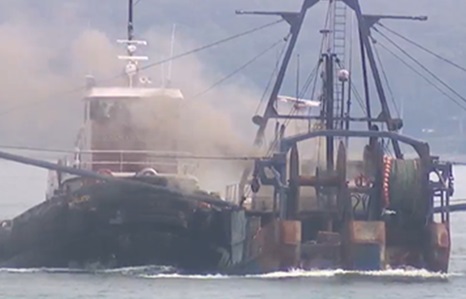
‘We’re alright:’ Crew member recalls terrifying boat fire aboard Portland fishing vessel
A fire at sea forced the crew of a Portland fishing vessel to abandon ship Sunday night. The fishing boat “Three Girls” caught fire around 9 p.m. Sunday while the crew was getting ready to haul in their nets. They had just minutes to get into an inflatable lifeboat before the fire overtook the ship. Portland firefighters doused the fishing boat with water, then twice put foam on the smoldering fire to put it out.One crew member says the last thing he did was go into the smoke-filled cabin to grab five survival suits before abandoning ship. The fishing vessel “Three Girls” was towed into Portland Harbor Wednesday afternoon, still burning from a Sunday night fire at sea that forced the captain and crew to quickly abandon ship. Photos, Video, more, >>CLICK TO READ<< 18:00
Anticipating the winds of change: A baseline assessment of Northeastern US continental shelf surficial substrates
 The introduction of thousands of wind turbines along the North American Atlantic continental shelf over the next decade will constitute the largest regional change in marine substrates since the retreat of the Laurentide Ice Sheet over 14,000 years ago. Here, two large data sets, SMAST drop camera survey (242,949 samples, 2003 to 2019) and the US Geological Survey databases (27,784 samples, 1966 to 2011), are combined to derive sea floor surficial substrate probability maps for the Northeastern US continental shelf from Virginia Beach to the Gulf of Maine to 300 m depth (218,571 km2). Geostatistical models were used to estimate the probability of five geologic and one biogenic substrate types being present at a 250 m resolution, and the proportional contribution of each substrate type to the seabed composition at a 500 m resolution. By providing the first synoptic maps depicting the probability of a particular substrate or combination of substrates occurring at any location on the Northeastern US continental shelf, including planned wind energy sites, we aim to (1) provide insights regarding how substrates in the areas selected for wind energy development compare with other locations, (2) motivate the development of a priori expectations for ecosystem changes to inform monitoring and research efforts going forward, and (3) to provide a baseline characterization of the Northeastern US continental shelf surficial substrates to support robust examination of the future changes observed in areas impacted by wind energy installations. more, >>CLICK TO READ<< 11:44
The introduction of thousands of wind turbines along the North American Atlantic continental shelf over the next decade will constitute the largest regional change in marine substrates since the retreat of the Laurentide Ice Sheet over 14,000 years ago. Here, two large data sets, SMAST drop camera survey (242,949 samples, 2003 to 2019) and the US Geological Survey databases (27,784 samples, 1966 to 2011), are combined to derive sea floor surficial substrate probability maps for the Northeastern US continental shelf from Virginia Beach to the Gulf of Maine to 300 m depth (218,571 km2). Geostatistical models were used to estimate the probability of five geologic and one biogenic substrate types being present at a 250 m resolution, and the proportional contribution of each substrate type to the seabed composition at a 500 m resolution. By providing the first synoptic maps depicting the probability of a particular substrate or combination of substrates occurring at any location on the Northeastern US continental shelf, including planned wind energy sites, we aim to (1) provide insights regarding how substrates in the areas selected for wind energy development compare with other locations, (2) motivate the development of a priori expectations for ecosystem changes to inform monitoring and research efforts going forward, and (3) to provide a baseline characterization of the Northeastern US continental shelf surficial substrates to support robust examination of the future changes observed in areas impacted by wind energy installations. more, >>CLICK TO READ<< 11:44
Lobster fishermen say tiny change in legal sizes could disrupt imperiled industry
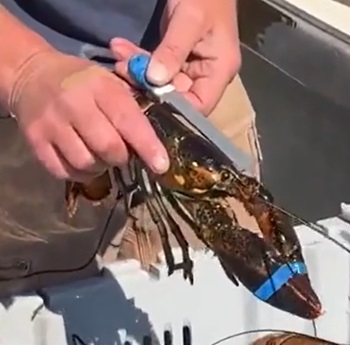 Gerry Cushman has seen Maine’s iconic lobster industry survive numerous threats in his three decades on the water, but the latest challenge, which might sound tiny, could be the biggest one yet. Lobster fishing is a game of inches, and the number of inches is about to change. Fishing regulators are instituting a new rule that lobster fishermen must abide by stricter minimum sizes for crustaceans they harvest. In addition to causing a dispute between fishermen and regulators, the change has led to confusion about the ramifications for international trade in one of the world’s most popular seafoods. “We don’t need any more, really, on our plate. It’s just a lot going on, one fight after another,” Cushman, 55, a boat captain who fishes out of Port Clyde, said. “We don’t need anything in the marketplace to lower the price of lobsters.” more, >>CLICK TO READ<< 09:59
Gerry Cushman has seen Maine’s iconic lobster industry survive numerous threats in his three decades on the water, but the latest challenge, which might sound tiny, could be the biggest one yet. Lobster fishing is a game of inches, and the number of inches is about to change. Fishing regulators are instituting a new rule that lobster fishermen must abide by stricter minimum sizes for crustaceans they harvest. In addition to causing a dispute between fishermen and regulators, the change has led to confusion about the ramifications for international trade in one of the world’s most popular seafoods. “We don’t need any more, really, on our plate. It’s just a lot going on, one fight after another,” Cushman, 55, a boat captain who fishes out of Port Clyde, said. “We don’t need anything in the marketplace to lower the price of lobsters.” more, >>CLICK TO READ<< 09:59
Shattered Wind Blade Puts Nantucket on Frontlines of a Clean-Energy Fight
 Weeks after a busted wind turbine washed onto Nantucket shores, residents of this wealthy Massachusetts enclave are still angry. Some even liken the accident to an oil spill. While their ire belies the fleeting nature of the event — waters were re-opened for swimming within 24 hours — the sense of harm felt by the community threatens to cast a long shadow. Vineyard Wind’s project south of Nantucket is the fledgling industry’s marquee venture, heralding a massive buildout of wind energy that would provide coastal cities with zero-carbon electricity. What happens here could have implications for a raft of other projects planned off Martha’s Vineyard, Atlantic City and elsewhere on the Eastern seaboard. “The great Nantucket experiment gets an F-minus,” says Kevin O’Leary, chairman of O’Leary Ventures and an investor on the reality show Shark Tank who visits Nantucket every summer. “It’s not a golden example of success in wind turbines, that’s for sure.” more, >>CLICK TO READ<< 08:24
Weeks after a busted wind turbine washed onto Nantucket shores, residents of this wealthy Massachusetts enclave are still angry. Some even liken the accident to an oil spill. While their ire belies the fleeting nature of the event — waters were re-opened for swimming within 24 hours — the sense of harm felt by the community threatens to cast a long shadow. Vineyard Wind’s project south of Nantucket is the fledgling industry’s marquee venture, heralding a massive buildout of wind energy that would provide coastal cities with zero-carbon electricity. What happens here could have implications for a raft of other projects planned off Martha’s Vineyard, Atlantic City and elsewhere on the Eastern seaboard. “The great Nantucket experiment gets an F-minus,” says Kevin O’Leary, chairman of O’Leary Ventures and an investor on the reality show Shark Tank who visits Nantucket every summer. “It’s not a golden example of success in wind turbines, that’s for sure.” more, >>CLICK TO READ<< 08:24
Athearn Marine Agency Boat of the Week: 35′ H & H Lobster Boat, 450HP Cummins QSL9 Diesel
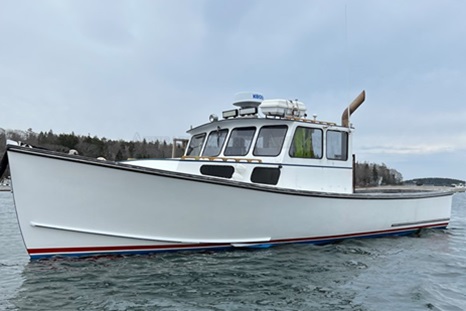 To review specifications, information, and 11 photos’, >click here< To see all the boats in this series, >click here< 06:32
To review specifications, information, and 11 photos’, >click here< To see all the boats in this series, >click here< 06:32
Lobster fishery set for reprieve on size limits
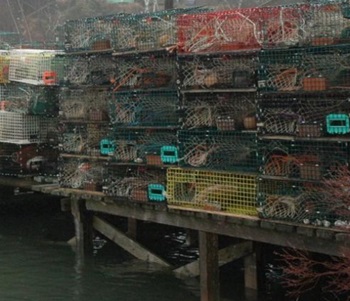 A second delay to implementing minimum gauge and vent sizes for lobsters caught in the Gulf of Maine, Georges Bank and Outer Cape Cod was initiated last week by the American Lobster Board, which operates under the Atlantic States Marine Fisheries Commission (ASMFC), a measure that Maine lobstermen, and Congressman Jared Golden, have hoped and pushed for. The new implementation date would be July 1, 2025, if the measure is adopted by the ASMFC’s American Lobster Board. An earlier delay the ASMFC approved had pushed back to Jan. 1, 2025, the new gauge and escape vent sizes in lobster traps for commercial lobster fisheries in the targeted lobster management areas. When the measure was first approved, it was to take effect based on a “trigger” mechanism. more, >>CLICK TO READ<< 12:52
A second delay to implementing minimum gauge and vent sizes for lobsters caught in the Gulf of Maine, Georges Bank and Outer Cape Cod was initiated last week by the American Lobster Board, which operates under the Atlantic States Marine Fisheries Commission (ASMFC), a measure that Maine lobstermen, and Congressman Jared Golden, have hoped and pushed for. The new implementation date would be July 1, 2025, if the measure is adopted by the ASMFC’s American Lobster Board. An earlier delay the ASMFC approved had pushed back to Jan. 1, 2025, the new gauge and escape vent sizes in lobster traps for commercial lobster fisheries in the targeted lobster management areas. When the measure was first approved, it was to take effect based on a “trigger” mechanism. more, >>CLICK TO READ<< 12:52
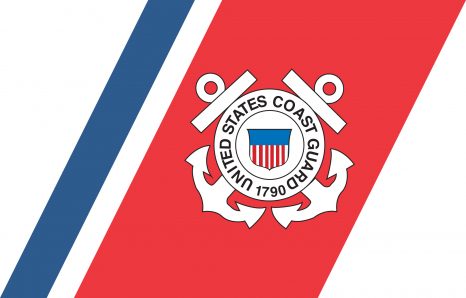
Coast Guard rescues 6 people after fire breaks out on commercial fishing vessel
The U.S. Coast Guard rescued six people after a boat fire led to them abandoning ship 105 nautical miles east of Portsmouth, New Hampshire, Sunday. The fishing vessel Three Girls, an 81-ft trawler, had four crew members, the captain, and a NOAA observer onboard. At 8:56 p.m., Coast Guard Sector Northern New England command center watchstanders received a mayday call from the Three Girls stating that the vessel was on fire and they were making preparations to abandon ship. The First Coast Guard District command center also received an Emergency Position Indicating Radio Beacon from the vessel. more, >>CLICK TO READ<< 14:25
I’m outraged by New Hampshire’s treatment of Geno Marconi
 I am outraged with the “paid administrative leave” of the Port Director, Geno Marconi and all the secrecy around it. I chaired the Ports and Harbors Advisory Committee for ten years. I was appointed by Governor Lynch and reappointed for another 5 year term. I also chaired the Piscataqua Maritime Commission (Sail Portsmouth) for 10 years where we brought Tall Ships to Portsmouth. I worked with Director Marconi very closely in both capacities and I can say without a shred of doubt that he is “by the book” and an imminently fair and honest man. Now with the suspension of his wife from her position as a State Supreme Court Justice, the pressure is turned up. Governor, you have messed with the wrong people. Director Marconi is not one to be pressured to resign. He is a by-the-book man, and you are about to learn that lesson. more, >>CLICK TO READ<<. by Donald Coker 10:45
I am outraged with the “paid administrative leave” of the Port Director, Geno Marconi and all the secrecy around it. I chaired the Ports and Harbors Advisory Committee for ten years. I was appointed by Governor Lynch and reappointed for another 5 year term. I also chaired the Piscataqua Maritime Commission (Sail Portsmouth) for 10 years where we brought Tall Ships to Portsmouth. I worked with Director Marconi very closely in both capacities and I can say without a shred of doubt that he is “by the book” and an imminently fair and honest man. Now with the suspension of his wife from her position as a State Supreme Court Justice, the pressure is turned up. Governor, you have messed with the wrong people. Director Marconi is not one to be pressured to resign. He is a by-the-book man, and you are about to learn that lesson. more, >>CLICK TO READ<<. by Donald Coker 10:45
Crawlers to Inspect Blades After Vineyard Wind Failure
 Vineyard Wind and GE Vernova on Friday released a plan outlining the steps to be followed after a turbine blade failure last month at the Vineyard Wind offshore project off the coast of Massachusetts, which left potentially dangerous debris on beaches on the island of Nantucket. Vineyard Wind, the first major U.S. offshore wind farm, was shut down by federal authorities after the turbine blade failure. The plan outlines the steps to be followed to recover the remainder of the blade on the turbine. It has been developed in consultation the U.S. Bureau of Safety and Environmental Enforcement and the U.S. Coast Guard, the companies said in a statement. more, >>CLICK TO READ<< 06:47
Vineyard Wind and GE Vernova on Friday released a plan outlining the steps to be followed after a turbine blade failure last month at the Vineyard Wind offshore project off the coast of Massachusetts, which left potentially dangerous debris on beaches on the island of Nantucket. Vineyard Wind, the first major U.S. offshore wind farm, was shut down by federal authorities after the turbine blade failure. The plan outlines the steps to be followed to recover the remainder of the blade on the turbine. It has been developed in consultation the U.S. Bureau of Safety and Environmental Enforcement and the U.S. Coast Guard, the companies said in a statement. more, >>CLICK TO READ<< 06:47
And they call this “green” energy.
 The centerpiece of Biden/Harris “accomplishments” is the 2022 Inflation Reduction Act, which included $369 billion worth of green giveaways/grants, including 30 gigawatts of offshore wind turbines by 2030. Harris plans to spend $10 trillion in public/private funding on green initiatives. So, how is it going? On July 13, a massive blade from a wind turbine nearly as tall as the Eiffel Tower collapsed into the Massachusetts Nantucket Sound for no apparent reason throwing the tourist destination into economic crisis at the height of the summer season. More than six truckloads’ worth of debris was collected, with more still washing up weeks later. Miles of the island’s famous ocean beaches had to be closed for days due to the dangerous debris, yet the media coverage was negligible. more, >>CLICK TO READ<< by Arthur Keller 07:17
The centerpiece of Biden/Harris “accomplishments” is the 2022 Inflation Reduction Act, which included $369 billion worth of green giveaways/grants, including 30 gigawatts of offshore wind turbines by 2030. Harris plans to spend $10 trillion in public/private funding on green initiatives. So, how is it going? On July 13, a massive blade from a wind turbine nearly as tall as the Eiffel Tower collapsed into the Massachusetts Nantucket Sound for no apparent reason throwing the tourist destination into economic crisis at the height of the summer season. More than six truckloads’ worth of debris was collected, with more still washing up weeks later. Miles of the island’s famous ocean beaches had to be closed for days due to the dangerous debris, yet the media coverage was negligible. more, >>CLICK TO READ<< by Arthur Keller 07:17
Gulf of Maine lobsters are experiencing a housing crisis
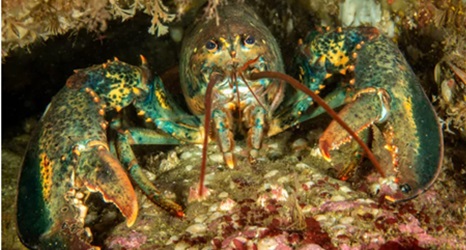 Lobster fishing has been a good business in the Gulf of Maine for a long time. With the exception of a few notable dips, both the landings and value of the catch have been on an upward swing for decades. Between 1984 and 2014, the lobster population in the Gulf of Maine jumped an estimated 515 percent, while simultaneously declining by 78 percent in southern New England as the water warmed in both regions. While it’s started to decline in recent years, numbers are still far higher than they were several decades ago. The result? A lobster housing crisis. “The warming sea temperatures have actually created a real sweet spot for lobster reproduction,” said Brian Skerry, a National Geographic photographer and producer on the recent GBH/PBS series Sea Change, which explores the impact of climate change on the Gulf of Maine. more, >>CLICK TO READ<< 17:51
Lobster fishing has been a good business in the Gulf of Maine for a long time. With the exception of a few notable dips, both the landings and value of the catch have been on an upward swing for decades. Between 1984 and 2014, the lobster population in the Gulf of Maine jumped an estimated 515 percent, while simultaneously declining by 78 percent in southern New England as the water warmed in both regions. While it’s started to decline in recent years, numbers are still far higher than they were several decades ago. The result? A lobster housing crisis. “The warming sea temperatures have actually created a real sweet spot for lobster reproduction,” said Brian Skerry, a National Geographic photographer and producer on the recent GBH/PBS series Sea Change, which explores the impact of climate change on the Gulf of Maine. more, >>CLICK TO READ<< 17:51

































